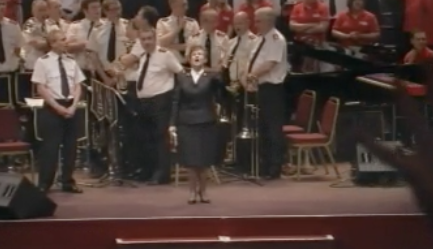It was good that, after lobbying from a number of us, THQ decided to make the congress meetings available to
watch again (although not for long, I hear - SP&S need to protect their revenue!).
General Bond is a powerful speaker. She has a limited but distinctive range of speech inflections - Step Mum and I still (fondly of course!) mimic her high-pitched 'Who wouldn't
want it?' strapline from her installation address.

For as long as she spoke about Jesus, she was on fire. Some of her political comments crashed and burned with me, though, but that's for another time. What the General does impeccably is lead an Army meeting. She has an innate musicality, and a sixth sense for creating and moulding atmosphere in a hall.
The musical highlights of the congress for me were not 'Blood of the lamb lite', (good as it was), nor the contributions of the staff sections. They were in the closing moments of the morning meeting, as the General led the congregational singing.
It is one of the beautiful freedoms of Salvationism that we have next to no set liturgy. As a meeting leader, the idea that you can take the congregation on a journey with the freedom to deviate, or stop off, at the spirit's guidance, is a wonderful tool. And so, having deftly rolled an uncommon but beautiful combination of tune and old Army words (SASB 643, 'We the people of thy host', to 'Healing Stream') to the boundary as she made her appeal (marred only by a howl of feedback from the PA system) the General decided to start knocking the ball all over the ground.
What happened next wasn't her fault - but it should teach us a valuable and transferable lesson.
"Let's sing the first verse of 'Jesus, keep me near the cross'".
The pianist had no need to change tunes, but the a/v team were out of the game. Not everyone knows those words any more. Barely anyone has a songbook of their own in a congress meeting these days. Those that could sing it (a good number, of course), did, and those that didn't know it, struggled.
You could have typed the words out several times in the time available, or searched the songbook for them.
But the screen stayed blank.
Undeterred, the General, being an all-rounder, bowled the pianist a googly. Or did she?
I happen to think that if you are the pianist in the Albert Hall for a congress led by the General, you ought to be able to manage the founder's song without the copy. Plenty of Army pianists could have. Great Grandad used to pick a chorus and surreptitiously indicate to his teenage son what key he wanted it in, sharps indicated by fingers on the right hand, flats on the left.
It turned out to be no matter. No sooner had the pianist wafted their bat at the incoming delivery and looked for a tune book, than General Bond plucked the ball from the air, one handed, as, with a commendable choice of pitch (not a cricketing analogy this time!), she started the singing '
and now, hallelujah!...',
a capella.
Boom.
That was what made my hairs stand on end.
The Albert Hall can be a swine to sing in - that's why those 'mushrooms' are there! But putting thousands of Salvationists in that famous cauldron and letting them sing is a dead cert for making a glorious noise. The most mellifluous and vocally-competent football crowd you ever heard.
In four distinct parts, '
boundless salvation, for you and for me' rattled round the walls, conducted, song book in hand, by the General herself. How I wish I'd been there, just for that.
But if you didn't know the words by heart? Well, we were halfway through singing it for the second time before the words appeared, accompanied by a bit more PA howl...
If the ISB had played one of their big pieces badly, or the ISS had forgotten a repeated chorus or coda, people would have been quick to say so. But when the audio visuals are poor, something that actually impedes the worship of the congregation, why the silence - and why let Powerpoint steal our spontaneity?
If I am in the congregation, my needs are few and simple, but increasingly forgotten - and this is true for lots of corps and lots of other churches now, but demonstrated by the congress.
I need to hear the spoken word
It really is inexcusable when the microphone gets switched on after someone has started speaking. How can I understand, be touched by, and respond to things I cannot hear or make sense of? See also: Mix, below.
I need access to the words when I sing
If you want me to sing from a screen, I need the words, the right words, to appear. I need them to advance at the right time; not to be expected to 'just know' when, say, a line is repeated. I need the words to be correctly spelled and punctuated. If this is too much to ask, can we just use the song book, which meets almost all the requirements?
This is divine worship. The best for the highest applies. If you can't play the piano, you don't offer to be the pianist. If God's not given you the gift of spelling, you might not be the one to write the slides.
Whoever runs the slides must give the task their full concentration, and must be sufficiently competent to dig out (or even type!) words quickly in order to help the leader of the meeting maintain their flow. Dare I say it, but no small degree of familiarity with scripture, and with Army music, songs and ecclesiology is necessary, and that these competencies are as critical as that of the pianist's ability to read music and play the piano.
I need an idea of the tune, and when to start singing!
Many songs in the Army song book have multiple tunes, and some of us like to mix them up even further than those suggestions (some of us even remember the rule, written in the songbook, of checking every verse actually fits the tune you've selected!).
How often, though, have you been in a meeting and a song is called, you rise to sing, and the first sound the band plays is the first note you are expected to sing? An introduction won't kill the band. It will introduce the tune and key, and it will give the congregation chance to get ready to sing. If it's not obvious, the meeting leader can also tell the congregation to which tune we are going to sing.
I need to hear a decent mix
It sometimes feels like the only feedback everyone accepts in an Army meeting is the howling through the PA, or the thud of people tapping on microphones to see if they're on.
Many Army halls have PA systems set with no reference to what is a
useful EQ balance. Too much bass, too little mid and treble, and thus vocals are often indistinct. I'm coming to worship, and not at the Ministry of Sound. If I can't hear and understand the spoken or sung word, I cannot respond to it.
I need to be able to sing my part
Choral singing is as much a part of Salvationist DNA as brass bands, if not more so, because it is more inclusive. We sing, we sing well, and we sing in four part harmony. Amazingly, we have done this since 1986 with a tune book that has barely any words in it, whilst the Welsh and Scots churches, supposedly behind the times, are still producing tonic sul-fa books for those who want them.
Why are we trying, particularly through the auspices of 'Scripture based songs' and the like, to turn Army meetings into 'Songs of Praise'?
Why are we so often, needlessly, being pushed into singing in unison? In that same congress meeting, did we really need to have 'Lobe den Herren' (which has survived the test of a long, long time) to the ridiculous new 'walzy' arrangement, when that monochromatic 'amen' could have sounded again from God's people in glorious technicolour? Vocally, as scripturally, there are many parts in one body.
Your Great Grandad was known as a man who was not easily riled, but Big Granded remembers that one night, in an Army meeting he was leading as a Divisonal Commander, he turned from the platform to a very talented 'busker' at the piano, saying
"Captain, could you just play the straightforward harmonies, please?" Save it for the offering, or the band or songster piece. Congregational singing has to be functional or it falls down!
When left to their own devices, those Salvationists in the Albert Hall did not sing in unison. Let's remember our heritage, and at least give people the choice by giving them the chance. This is
their worship, too.
Second only to the General's skill and craft as a preacher and meeting leader, I was struck that congress gave us an example of how more and more, we are seeking to use modern technologies, which can make or break a meeting, and the extent to which people engage with the ministry of God's word. We need worship to be inclusive, accessible, clear and simple. And we need to remain true to who we are.
These tools (and boy have some corps spent money!) are only as good as the workmen. Maybe it's time that we should elevate the standing, the training, and our expectations, of the person doing the audio-visuals. We have made them the most important person in the meeting, after the preacher.
Love from Daddy















